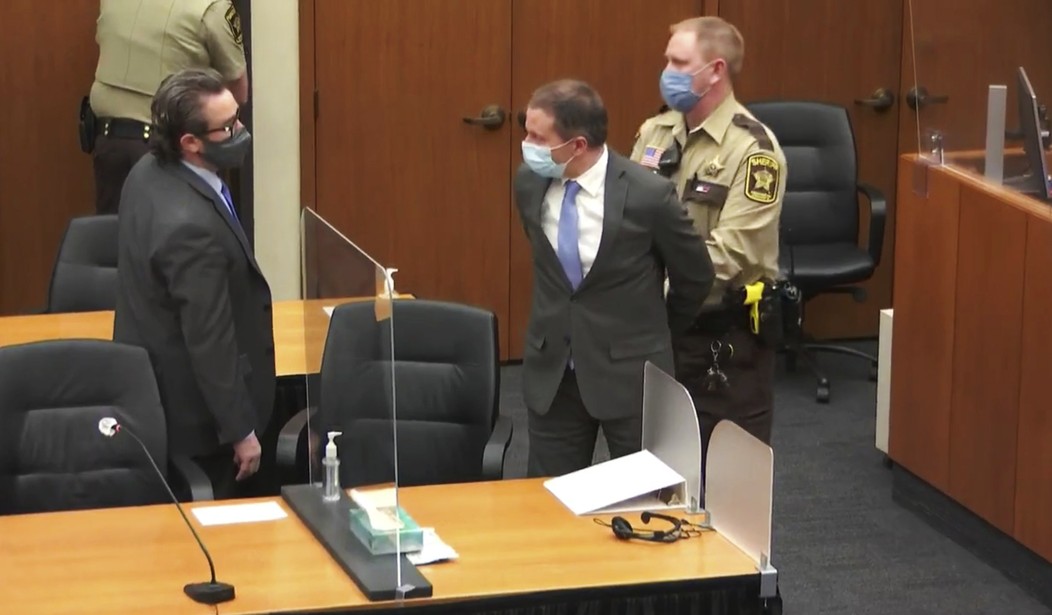In a somewhat surprising development — from the standpoint of timing if nothing else — the Biden Justice Department has obtained an indictment of four former Minneapolis Police Officers, including Derek Chauvin, on charges they violated the federal civil rights of George Floyd and thereby caused his death.
Indicted along with Chauvin are three other officers who were at the scene and assisted in arresting Floyd — Thou Thao, J. Alexander Kueng, and Thomas Lane.
Chauvin was also indicted in a second unrelated case where he was charged with the same crime in a separate episode. He is alleged to have unlawfully struck a minor suspect several times with a flashlight while holding the suspect by the neck in 2017.
With regard to Floyd, the indictment charges three different violations of 18 U.S.C. Section 242 — deprivation of rights under color of law, specifically the right to be free from an unreasonable seizure.
Count One charges only Chauvin, and alleges that Floyd’s civil rights were violated as follows:
Defendant Chauvin held his left knee across George Floyd’s neck, and his right knee on Floyd’s back and arm, as George Floyd lay on the ground, handcuffed and unresisting, and kept his knees on Floyd’s neck and body even after Floyd became unresponsive.
Count Two charges only defendants Thao and Kueng, and alleges that they violated Floyd’s rights as follows:
Defendants Kueng and Thao were aware that Defendant Chauvin was holding his knee across George Floyd’s neck as Floyd lay handcuffed and unresisting, and that Defendant Chauvin continued to hold Floyd to the ground even after Floyd became unresponsive, and the defendants willfully failed to intervene to stop Defendant Chauvin’s use of unreasonable force.
Count Three charges all four Defendants, and alleges they violated Floyd’s rights as follows:
[T]he defendants saw George Floyd lying on the ground in clear need of medical care, and willfully failed to aid Floyd, thereby acting with deliberate indifference to a substantial risk of harm to Floyd.
I’m going to hold off on an analysis of these charges based on the specific factual allegations until I have more time to study them, but I’m a bit dubious about the legal proposition set forth in Count Three under the “color of authority” statute.
But there are a few matters that are worth mentioning at this point.
This Press Release issued by the Department of Justice came out of Washington DC, not the US Attorney’s Office in Minnesota. That is a strong indication that the case is being pushed by the Civil Rights Division — not surprising.
The Press Release lists the names of two attorneys from the Civil Rights Division and five Assistant United States Attorneys from the U.S. Attorney’s Office in Minnesota as handling the case. This is typical as most prosecutions of this nature are undertaken as joint efforts. The Civil Rights Division attorneys bring a level of “subject matter expertise” (or they claim to), while the local AUSAs deal regularly with the Court and generally have more courtroom experience. But in this case, the Civil Rights Division — stocked with loads of left-wing “true believers” — will be calling the shots here.
The timing is curious because bringing the indictment now is contrary to DOJ’s long-established policy regarding “dual and successive prosecutions,” known as the “Petite Policy,” set forth at Sec. 9-2.031 of the Department of Justice Manual.
Again, I’ll reserve a lengthy discussion of the Petite Policy for another time, but there are three prerequisites set forth in the policy for bringing a federal prosecution in a matter based on substantially identical facts as a state prosecution that has already been undertaken:
[F]irst, the matter must involve a substantial federal interest; second, the prior prosecution must have left that interest demonstrably unvindicated; and third, applying the same test that is applicable to all federal prosecutions, the government must believe that the defendant’s conduct constitutes a federal offense, and that the admissible evidence probably will be sufficient to obtain and sustain a conviction by an unbiased trier of fact.
The issue here would seem to involve at least the first two requirements — is there a substantial federal interest, and has that interest been left demonstrably unvindicated?
The federal charges here are in the same basic category as the state charges — alleged unlawful use of force by a police officer that led to the death of an in-custody suspect. To the extent there is any distinct federal interest, it is hard to see how it is “demonstrably unvindicated” — Chauvin has been convicted, and based on the theory of case presented against him, there is a significant likelihood that the other three officers will be convicted as well. All three were involved in holding Floyd down in the prone position and applying weight to his back to keep him from moving, and the state’s experts testified that was the mechanism that led to Floyd’s death.
It is self-evident that any federal interest that might exist would be left unvindicated if any of the three officers were acquitted — or if Chauvin is granted a new trial. Has the Biden DOJ sought and obtained this indictment now out of fear that one or both of those things might happen? It is hard to see what the justification might be for having taken this step at this time.
Chauvin will now be appointed experienced defense counsel that practices regularly in federal court — maybe even the Federal Defender’s Office if they do not have a conflict of interest. The attorneys in that office are hired by the Court, and in my experience over 23 years, some of the best defense counsel I ever faced were members of the Assistant Federal Defenders.
Chauvin’s defense will also be given money for investigators and experts — and the amounts they can ask for will likely be far in excess of what was spent on Chauvin’s defense in state court.
The Federal Rules of Evidence will be enforced much more strictly than what I saw take place in Chauvin’s state trial. You won’t see bystander witnesses on the stand offering opinions about what was happening. You won’t have an “MMA” guy mentioning “blood chokes”. You won’t see six or more prosecution experts all testifying on the same “Use of Force” standards, covering the same issues over and over again. You will not see a Police Chief, with almost no experience arresting anyone, offering an opinion on what the officers did that day.
The use of expert testimony will be much more contained under federal standards than what happened in state court.
But, most importantly in my view, the federal judge assigned to the case will be required to follow the federal procedure for making a determination on whether prejudicial pretrial publicity makes it impossible for the officers to obtain a fair trial in front of an impartial jury as they are guaranteed under the Fifth and Sixth Amendments to the Constitution. The process as required by federal appellate and Supreme Court precedent is much more involved than I saw take place in Judge Cahill’s courtroom. If the federal judge comes to the conclusion after an extended inquiry that a fair trial before an impartial jury is not possible in the District of Minnesota, that is going to reverberate in Chauvin’s state court appeal — and thereafter.
The case has been assigned to Senior Federal District Court Judge Paul A. Magnuson.
Judge Magnuson was appointed to the Court — by Pres. Reagan in 1981. He turned 84 in February and is reported online as having an active caseload.
In my experience, many federal judges quit handling criminal trials when they assume Senior Status, as they are able to limit the types and amount of work they do at that stage.
The Senior Status judges who continue to take criminal cases do so because they enjoy the criminal trial process. I suspect that in his 40 years on the bench Judge Magnuson has presided over hundreds of criminal jury trials.
We won’t have cameras in the courtroom this time, and this case might move quite fast. A federal defendant has a statutory right to go to trial within 70 days of his initial appearance. Given that the state trial just ended, and the defense has that transcript to work from in terms of the facts and witnesses likely to testify, it might make sense for the defense to push the matter to the earliest possible trial date.
I’ll have another story soon taking a closer look at these and other issues.
But very little about what DOJ did today makes sense to me. I think it has the potential to cause problems in a variety of ways.
Did the Minnesota Attorney General request DOJ to charge the three officers who haven’t gone to trial yet? Will the Minnesota AG drop that case out of fear of maybe losing it??
Hmmm.













Join the conversation as a VIP Member